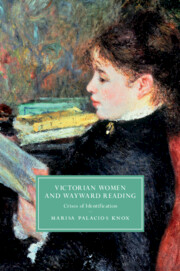Book contents
- Victorian Women and Wayward Reading
- Cambridge Studies in Nineteenth-Century Literature and Culture
- Victorian Women and Wayward Reading
- Copyright page
- Dedication
- Contents
- Figures
- Acknowledgments
- Introduction
- Chapter 1 Masculine Identification and Marital Dissolution
- Chapter 2 Novels without Heroines: Sensation and Elective Identification
- Chapter 3 Character Invasion and the Victorian Actress
- Chapter 4 Antipathetic Telepathy: Female Mediums and Reading the Enemy
- Chapter 5 “The Valley of the Shadow of Books”: The Morbidity of Female Detachment
- Chapter 6 The New Crisis: Can We Teach Identification?
- Notes
- Works Cited
- Index
- Cambridge Studies in Nineteenth-Century Literature and Culture
Chapter 5 - “The Valley of the Shadow of Books”: The Morbidity of Female Detachment
Published online by Cambridge University Press: 30 October 2020
- Victorian Women and Wayward Reading
- Cambridge Studies in Nineteenth-Century Literature and Culture
- Victorian Women and Wayward Reading
- Copyright page
- Dedication
- Contents
- Figures
- Acknowledgments
- Introduction
- Chapter 1 Masculine Identification and Marital Dissolution
- Chapter 2 Novels without Heroines: Sensation and Elective Identification
- Chapter 3 Character Invasion and the Victorian Actress
- Chapter 4 Antipathetic Telepathy: Female Mediums and Reading the Enemy
- Chapter 5 “The Valley of the Shadow of Books”: The Morbidity of Female Detachment
- Chapter 6 The New Crisis: Can We Teach Identification?
- Notes
- Works Cited
- Index
- Cambridge Studies in Nineteenth-Century Literature and Culture
Summary
This chapter locates a new cultural anxiety in the late nineteenth century about the woman who under-identifies, that is, refuses or is simply incapable of a feminine standard of emotional identification with literature. The expression of this anxiety, in New Woman novels of the fin de siècle and George Gissing’s New Grub Street and The Odd Women, reveals the ways in which identification can both reinforce and subvert gender categories. In these novels, and in sources ranging from proceedings of the British Medical Association to humor magazines, Victorian commentators blamed women’s apparent detachment from literary identification on the professionalization of their reading, and attributed its symptoms to a kind of sickness or blighted fertility. Women’s emotional disinvestment from literature was depicted as not merely wayward but pathological. More than a century of overt crises about the management of female identification culminated in the fear that women might not emotionally identify with literature at all, validating the book’s larger argument that irrational identification had come to define femininity itself.
Keywords
- Type
- Chapter
- Information
- Victorian Women and Wayward ReadingCrises of Identification, pp. 119 - 145Publisher: Cambridge University PressPrint publication year: 2020

